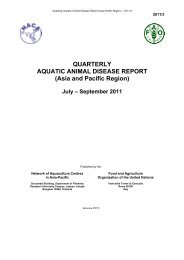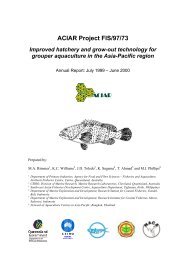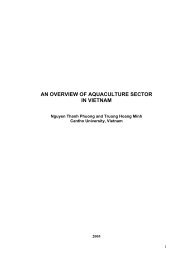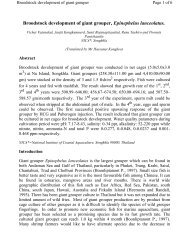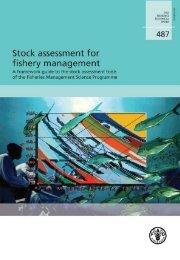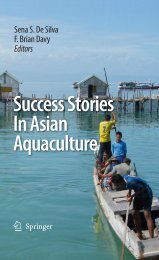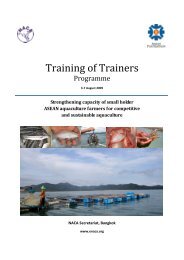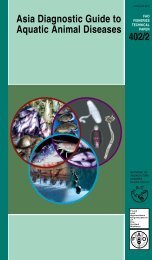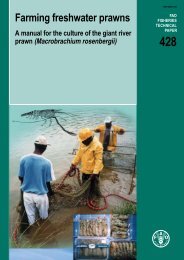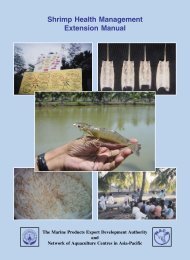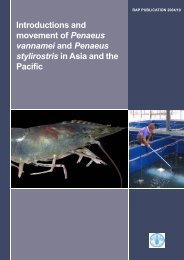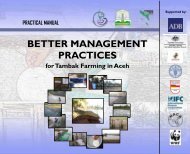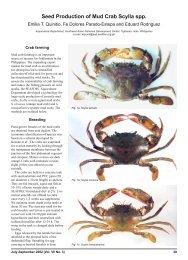Such initiatives have been or are being developed for agricultural products (some of <strong>the</strong>m wellestablished), forestry products, <strong>and</strong>, more recently, fishery products. The time is ripe for environmentalcertification for shrimp production. Such schemes will require <strong>the</strong> establishment of generally acceptedpractices for siting <strong>and</strong> operating farms (ideally, developed through collaboration between industry,government, consumer groups, <strong>and</strong> environmental interests); impartial certification procedures;specific, easy-to-underst<strong>and</strong> steps for monitoring <strong>the</strong> distribution <strong>and</strong> marketing chain. The potentialfor <strong>the</strong>se initiatives is discussed in more detail by Clay (1996; 1997) <strong>and</strong> GESAMP (1999). Successwill depend critically on four factors:• The willingness of <strong>the</strong> consumer to pay a premium for more sustainably produced shrimp;• The capacity to track product from producer to retailer;• The capacity to monitor <strong>and</strong> certify sustainable production <strong>and</strong> management practices; <strong>and</strong>• The allocation of a reasonable proportion of <strong>the</strong> premium to <strong>the</strong> producer.However, some preliminary initiatives that use certification conditional only on siting, <strong>and</strong> <strong>the</strong>existence of a credible local sector development <strong>and</strong> management plan (based on a thorough sectorenvironmental assessment), may offer a first step in developing more sophisticated initiatives (e.g., <strong>the</strong>Thai Code of Conduct 1998, <strong>the</strong> GAA Code 1999).Government constraintsA variety of economic constraints have been proposed for shrimp aquaculture. In general, <strong>the</strong>y are lesslikely to be effective than incentives, since people can generally find ways to avoid <strong>the</strong>m. None<strong>the</strong>less,<strong>the</strong>y may be appropriate in some circumstances.Many authors have proposed <strong>the</strong> use of environmental performance bonds. These require that would-beshrimp farm developers make a payment or bond redeemable only if environmental quality in <strong>the</strong>vicinity of <strong>the</strong> farm is not degraded, or only if <strong>the</strong> environment is restored should <strong>the</strong> operation beab<strong>and</strong>oned, or both. Such bonds are generally considered only for large-scale operations with externalinvestors. However, <strong>the</strong>y may be applied more widely to small operations if local government includes<strong>the</strong> requirements <strong>and</strong> necessary guidance as part of a farm licensing policy. A pool of funds from small<strong>and</strong> large operations would be used to restore failed <strong>and</strong> ab<strong>and</strong>oned shrimp farms, where necessary.An example of such an approach comes from India, where eco-restoration taxes were included in <strong>the</strong>regulations passed by <strong>the</strong> State Assembly in Tamil Nadu in 1996 to regulate shrimp farming. The taxwas intended for use in restoring ab<strong>and</strong>oned farms to <strong>the</strong>ir pre-implementation condition.The interplay between regulations, negative <strong>and</strong> positive taxes, <strong>and</strong> o<strong>the</strong>r incentives should be carefullyconsidered in order to achieve optimum shrimp farming practices. The use of tax incentives <strong>and</strong> o<strong>the</strong>rgovernment-instituted incentives to advance sustainable shrimp farming appears to be little used <strong>and</strong>not well documented. This obviously is an area that requires fur<strong>the</strong>r investigation.Design <strong>and</strong> implementation of operational codesGovernment is well placed to initiate <strong>the</strong> development of codes <strong>and</strong> st<strong>and</strong>ards for <strong>the</strong> industry, <strong>and</strong>devise means to encourage <strong>the</strong>ir adoption (such as using licenses or access rights conditional on <strong>the</strong>iradoption). These st<strong>and</strong>ards, however, must be practical <strong>and</strong> capable of wide adoption—in o<strong>the</strong>r words,<strong>the</strong>y need to be developed in close collaboration with farmers <strong>and</strong> o<strong>the</strong>rs involved in <strong>the</strong> industry. Thecodes may be broadly based on <strong>the</strong> mitigation measures discussed in Chapters 3–5, <strong>and</strong> also on existinggeneral codes <strong>and</strong> guidelines such as <strong>the</strong> FAO Technical Guidelines for Responsible Fisheries (No. 5:Aquaculture Development) <strong>and</strong> o<strong>the</strong>rs. (Codes of design <strong>and</strong> practice for sustainable aquaculture canbe found in documents including UNEP 1990; FAO 1997; Global Aquaculture Alliance 1998;SEACAM 1999; Australian Prawn Farmers Association 1998; <strong>and</strong> Government of Belize 1997.) Codeswill need to be adapted to suit <strong>the</strong> needs of specific countries, <strong>and</strong> indeed specific zones within <strong>the</strong>m, aswell as different types of production systems.NGO initiativesSeveral NGOs have addressed <strong>the</strong> environmental problems caused by shrimp farming. In all <strong>the</strong> mainproducer countries of farmed shrimp, NGOs are actively working for stronger regulation of <strong>the</strong>industry. In 1996 an NGO Statement Concerning Unsustainable Aquaculture was given to <strong>the</strong> UN59
Commission on Sustainable Development, listing a number of points to which governments wereinvited to agree. These opinions were fur<strong>the</strong>r formalized in <strong>the</strong> Choluteca declaration of October 1996,made by NGOs from Latin America, Europe, <strong>and</strong> Asia in Choluteca, Honduras. A Resolution onMangrove Forests was made by several NGOs in December 1996, urging governments to “takeimmediate action to halt <strong>the</strong> expansion of industrial shrimp farming which is destroying mangroveforests.”In addition, <strong>the</strong> first <strong>Shrimp</strong> Tribunal was held in April 1996 <strong>and</strong> included a government-NGOdialogue on <strong>the</strong> sustainability of shrimp trawling <strong>and</strong> farming. Representatives from <strong>the</strong> major producercountries were present, toge<strong>the</strong>r with a number of NGOs. The second <strong>Shrimp</strong> Tribunal was held inApril 1997.The Industrial <strong>Shrimp</strong> Action Network (ISANet) was formally established in 1997 as an umbrellaorganization of dozens of NGOs in both <strong>the</strong> South <strong>and</strong> <strong>the</strong> North who are concerned about <strong>the</strong>uncontrolled expansion <strong>and</strong> negative impacts of industrial shrimp aquaculture <strong>and</strong> are working toge<strong>the</strong>rto oppose it. No single strategy has been developed by this confederation. Some groups within it haveopposed <strong>the</strong> industry, while o<strong>the</strong>rs have attempted to engage it.Farmer <strong>and</strong> industry initiativesIn recent years, farmers in both <strong>the</strong> Americas <strong>and</strong> Asia have recognized <strong>the</strong> need for improvedenvironmental management of <strong>the</strong> industry at local, national, <strong>and</strong> international levels. At <strong>the</strong> locallevel, farmers have organized to cooperate on issues such as wastewater management. Farmers in SuratThani in sou<strong>the</strong>rn Thail<strong>and</strong> cooperate to ensure that <strong>the</strong>y minimize both pollution of each o<strong>the</strong>r’s watersupply <strong>and</strong> <strong>the</strong> spread of disease. Farmers in Ecuador are working with <strong>the</strong> NGO Fundacion Natura topromote mangrove conservation.At <strong>the</strong> international industry level, traders, processors, <strong>and</strong> farmers (mainly large-scale) established <strong>the</strong><strong>Shrimp</strong> Council in 1996. In February 1997, <strong>the</strong> <strong>Shrimp</strong> Council presented a four-point initiative thataddresses environmental concerns. It has since spawned <strong>the</strong> Global Aquaculture Alliance, a broaderbasedindustry alliance that has developed, in collaboration with scientists, its own code of practice forsustainable shrimp culture which is available on <strong>the</strong> Internet (Global Aquaculture Alliance 1998).Farmer organization is extremely important to facilitate <strong>the</strong> processes of sector environmentalassessment <strong>and</strong> integrated coastal management. Typically, organizing <strong>and</strong> training farmers is moreeffectively carried out by NGOs, experts, <strong>and</strong> consultants than by government, whose involvement maybe mistrusted (Robadue 1995; Ochoa 1995).Scientific researchEven a casual observation of <strong>the</strong> world’s aquaculture industry reveals <strong>the</strong> importance of scientificresearch, for improving production techniques as well as for environmental protection. Manydeveloping countries have no resources to engage in such research, <strong>and</strong> must, <strong>the</strong>refore, ei<strong>the</strong>r rely onresearch done by o<strong>the</strong>rs or do without <strong>the</strong> results of modern science. The failure to invest in research<strong>and</strong> systems to disseminate findings efficiently has resulted in a lack of knowledge about <strong>the</strong> issues thatpose <strong>the</strong> most serious threats to <strong>the</strong> industry <strong>and</strong> to <strong>the</strong> environment.Key areas for research at <strong>the</strong> local level include <strong>the</strong> assessment of natural resources, <strong>the</strong>ir functions,dependencies, <strong>and</strong> value; <strong>and</strong> <strong>the</strong> assessment of environmental capacity in relation to economicdevelopments, including aquaculture in <strong>the</strong> coastal zone.For most developing countries, economic priorities determine whe<strong>the</strong>r <strong>the</strong>y engage in scientificresearch. Often, research related to <strong>the</strong> negative effects of a booming industry is ignored because of <strong>the</strong>substantial immediate returns from <strong>the</strong> industry, while funds available are spent on o<strong>the</strong>r, apparentlymore urgent, matters.60
- Page 7 and 8:
sensitivity analysis should include
- Page 9 and 10:
ABBREVIATIONSMTkgmcmhaozPUDFOBCIFC&
- Page 11 and 12:
ORGANIZATION OF THE REPORTIn Chapte
- Page 13 and 14:
same time, development is necessary
- Page 15 and 16:
Current shrimp farming practice inc
- Page 17 and 18:
Current status of the industryToday
- Page 19 and 20: In recent years, several major crop
- Page 21: CHAPTER 2: SHRIMP FARMING SYSTEMSSh
- Page 24 and 25: FeedsHatcheries use a combination o
- Page 26 and 27: FIGURE 8. CONTINUUM OF DIFFERENT SH
- Page 28 and 29: TABLE 3. COMPARISON OF INPUTS FOR T
- Page 30 and 31: Shrimp farming systems vary greatly
- Page 32 and 33: creeks, and sea-grass beds, fulfill
- Page 34 and 35: arrangement in Thailand, for exampl
- Page 36 and 37: capacity is not exceeded, the nutri
- Page 38 and 39: shrimp or high-value finfish produc
- Page 40 and 41: In more immediately practical terms
- Page 42 and 43: Disease prevention and managementDi
- Page 44 and 45: (Raa 1996) indicates that it is pos
- Page 46 and 47: suitable for human consumption or f
- Page 48 and 49: • Supply and effluent canals shou
- Page 50 and 51: CHAPTER 4: SOCIAL AND ECONOMIC IMPA
- Page 52 and 53: opportunities would need to be iden
- Page 54 and 55: 26 workdays per hectare, and an ext
- Page 56 and 57: One of the key elements for success
- Page 58 and 59: Minimizing negative social repercus
- Page 60 and 61: CHAPTER 5: FINANCIAL RISKS ASSOCIAT
- Page 62 and 63: Credit riskAccess to credit at fair
- Page 64 and 65: Natural factorsShrimp diseaseThe ou
- Page 66 and 67: CHAPTER 6: PLANNING AND MANAGEMENT
- Page 68 and 69: Planning and resource managementIna
- Page 72 and 73: Conclusions and recommendationsReco
- Page 74 and 75: equired to promote sustainability a
- Page 76 and 77: CHAPTER 7: PROJECT PLANNING AND ASS
- Page 78 and 79: • Appraisal and supervision missi
- Page 80 and 81: The structure of the executive summ
- Page 82 and 83: CHAPTER 8: CONCLUSIONS, RECOMMENDAT
- Page 84 and 85: • Requirements and guidance for f
- Page 86 and 87: EmploymentAs mentioned in the repor
- Page 88 and 89: ANNEX 1: A BLUEPRINT FOR FEASIBILIT
- Page 90 and 91: • Sensitivity calculations and an
- Page 92 and 93: Table A4: World shrimp farming prod
- Page 94 and 95: ANNEX 4: CASE STUDIES UNDERTAKEN BY
- Page 96 and 97: ColombiaThe Adoption of Good Manage
- Page 98 and 99: LocationAppendix A--Meetings Held o
- Page 100 and 101: LocationAppendix A--Meetings Held o
- Page 102 and 103: LocationAppendix A--Meetings Held o
- Page 104 and 105: BIBLIOGRAPHYAdger, W.N. 1998. Susta
- Page 106 and 107: Claridge, G. 1996. Legal approaches
- Page 108 and 109: Hambrey, J.B., M. Phillips, K. Chow
- Page 110 and 111: Phillips, M.J., & D.J. Macintosh. 1
- Page 112: World Commission on Environment and



